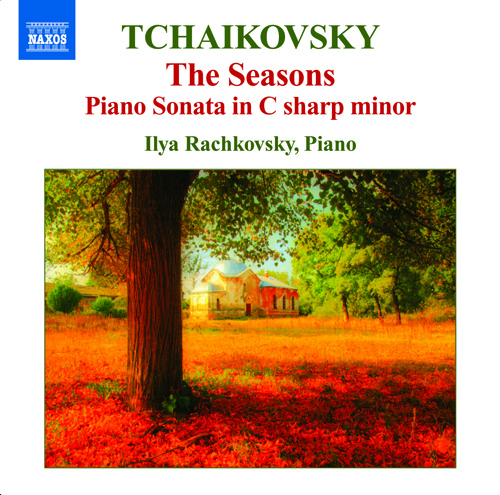TCHAIKOVSKY, P.I.: Seasons (The) / Piano Sonata in C-Sharp Minor (Rachkovsky)
Tchaikovsky’s The Seasons is a collection of twelve piano pieces, each one representing a month of the year, from the melancholy fireside in January, through Carnival, the song of the lark, April snowdrops and the nights of May, to the wistful barcarolle of June, the cutter of hay, harvest, hunting, October autumn, the sleigh-bells of the November troika and to Christmas. These charming and ever-popular pieces offer occasional challenges to the technical proficiency of the amateurs for whom they were intended. Tchaikovsky’s Sonata in C sharp minor is an early work, whose third movement was used by the composer for the Scherzo of his First Symphony ‘Winter Daydreams’, written the following year.
Formed by the Council of Ministers of Ukraine in November of 1918, the National Symphony Orchestra of Ukraine (NSOU) is considered to be one of the finest symphony orchestras in Eastern Europe. The orchestra has given the premiere performances of works by Prokofiev, Shostakovich, Khachaturian, Lyatoshinsky, Valentin Silvestrov and Myroslav Skoryk.
A distinguished list of conductors has worked with the orchestra including Leopold Stokowski, Igor Markevitch, Kurt Sanderling, Evgeny Mravinsky, Kirill Kondrashin, Evgeny Svetlanov, Gennady Rozhdestvensky and Theodore Kuchar, as well as many pre-eminent soloists that include Arthur Rubinstein, Yehudi Menuhin, Isaac Stern, David Oistrakh, Sviatoslav Richter, Mstislav Rostropovich, Emil Gilels, Gidon Kremer, Montserrat Caballé, José Carreras and Juan Diego Flórez, among others.
The orchestra has gained international recognition and critical acclaim, receiving two GRAMMY nominations, and has undertaken many successful concert tours in Europe, the US, Asia, the Middle East and Australia. Vladimir Sirenko has been the orchestra’s artistic director and chief conductor since April 1999.
www.nsou.com.ua


Mussorgsky was one of the five Russian nationalist composers roughly grouped under the influence of the unreliable Balakirev. Initially an army officer and later, intermittently, a civil servant, Mussorgsky left much unfinished at his death in 1881. Nevertheless, his influence on composers such as Janáček was considerable, not least in the association he found between speech intonations and rhythms and melody.
Rimsky-Korsakov, a musician who had acquired a more conventional technique of orchestration and composition, revised and completed a number of Mussorgsky’s works, versions which now may seem inferior to the innovative original compositions as Mussorgsky conceived them.
Operas
The greatest of Mussorgsky’s creations was the opera Boris Godunov, based on Pushkin and Karamazin, with a thoroughly Russian historical subject. He completed the first version in 1869 and a second version in the 1870s, but it was Rimsky-Korsakov’s version that was first performed outside Russia. The opera provides an important part for a bass in the role of Boris. Other operas by Mussorgsky include Khovanshchina, completed and orchestrated by Rimsky-Korsakov. A later version by Shostakovich restores more of the original text. The opera Sorochintsy Fair, after Gogol, completed by Lyadov and others, includes the orchestral favourite A Night on the Bare Mountain—an orchestral witches’ sabbath.
Piano Music
Mussorgsky’s 1874 suite Pictures at an Exhibition, a tribute to the versatile artist Hartman, has proved the most popular of all the composer’s works, both in its original version for piano and in colourful orchestral versions, of which Maurice Ravel’s has proved the most generally acceptable. Linked by ‘Promenades’ for the visitor to the exhibition, Mussorgsky represents in music a varied collection, from the ‘Market of Limoges’ and the ‘Catacombs’ to the final ‘Great Gate of Kiev’—a monumental translation into music of an architectural design for a triumphal gateway.
Vocal Music
Mussorgsky wrote a number of choral works and songs, many of the latter of considerable interest, including the group The Nursery. ‘The Song of the Flea’, based on Goethe’s Mephistophelean song in Faust, is a bass favourite.































